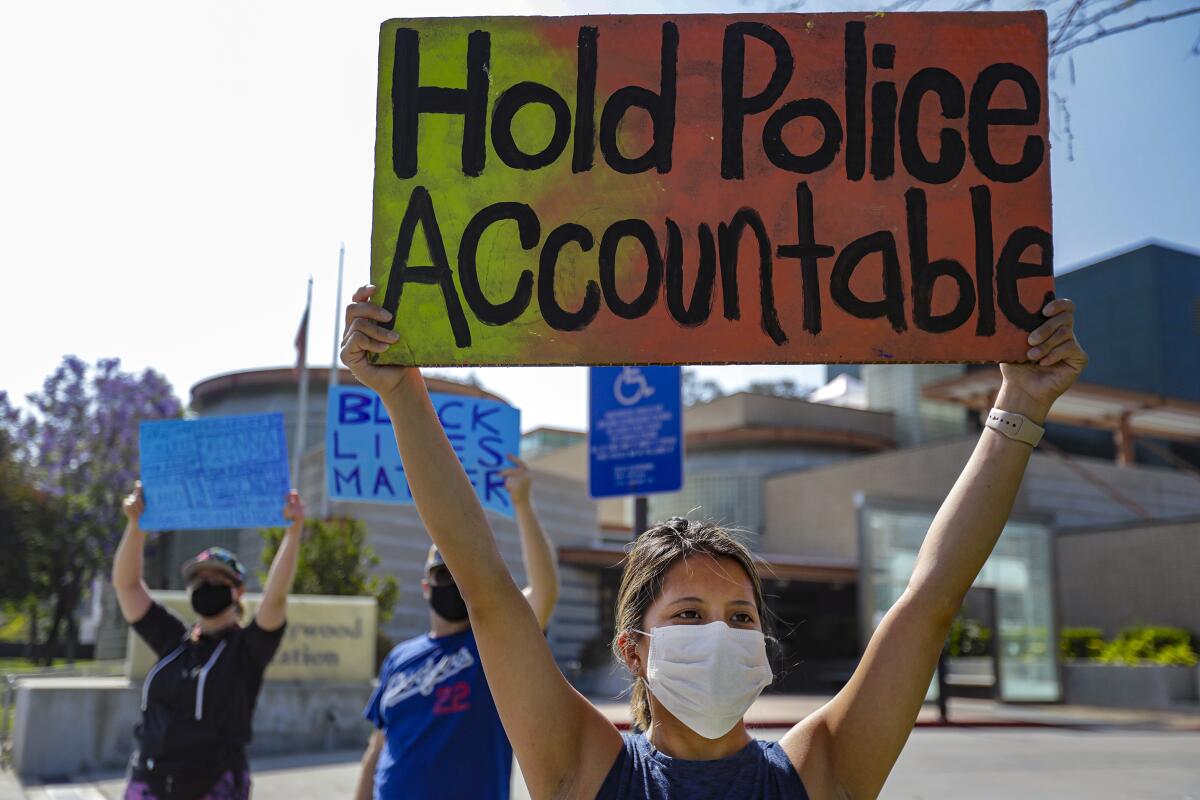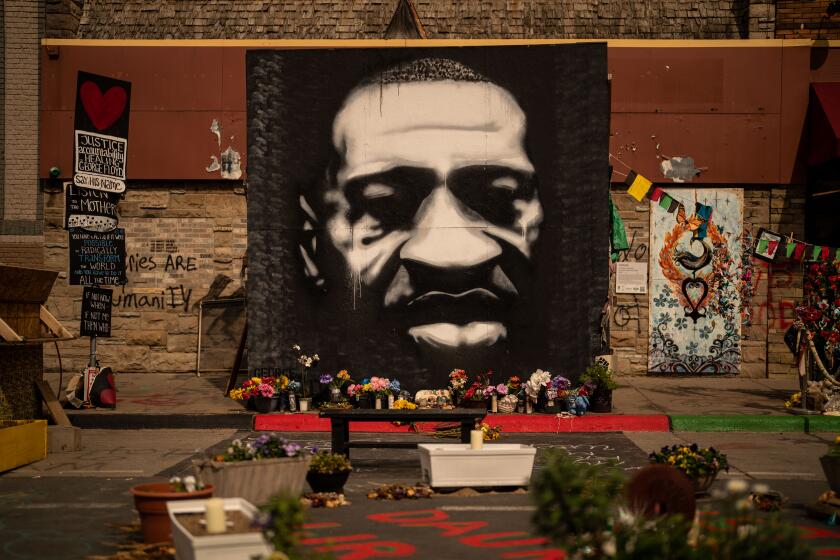Column: How the LAPD got this way and five concrete ways it needs to change

There will be no justice for George Floyd. A year has passed and I’ve accepted that. Floyd is dead and nothing we say or do will bring him back from the grave.
But one thing we can do to memorialize his sacrifice is change the system that led to his murder — and that means remaking the culture of policing.
The question now is whether we are still outraged enough by those nine horrific minutes of video to push for changes that go beyond amorphous calls to “defund the police.”
California prides itself on being enlightened and progressive about racial justice. But a year of racial reckonings later, not much has changed.
The Floyd case has made clear the kind of basic reforms that are needed, including these five, which shouldn’t be so hard to push through:
— Stop trying so hard to lock up petty miscreants; a man shouldn’t be handcuffed and pinned to the ground — much less lose his life — over a fake $20 bill. We need parallel systems to deal with chronic nonviolent offenses and mental-health-related calls.
— Adopt rules requiring police officers to intervene and report whenever they see abuse or misconduct by another officer. Two of the cops on Minneapolis Police Officer Derek Chauvin’s team tried timidly to express concern that Floyd was in physical distress, but backed off when Chauvin shut them up.
— Enforce edicts that require de-escalation techniques, and make sure officers are trained in their use. A recent LAPD report showed that officers often fail to follow mandated steps intended to keep encounters from turning violent — including calling for backup early on, communicating clearly to one another and planning in advance for hazardous contingencies.
— Elect prosecutors who are not afraid to put officers on trial for abuse. The fact that convictions are hard to achieve should not be a deterrent. We need to send a public message that law enforcement officials will be held accountable when they violate the law and the oath their job requires.
— And give more power to our police chief to discipline or fire problem or abusive officers, a role often blocked by procedural provisions. Chauvin had amassed a long list of citizen complaints, and yet he was tasked with training rookie officers. That’s how the values and culture of a department are instilled.
::
Los Angeles has been at this sort of crossroads before. After the beating of Rodney King, the Los Angeles Police Department was scrutinized by an independent panel whose report confirmed that the “problem of excessive force is exacerbated by racism and bias within the LAPD.” That ultimately helped lead to a federal consent decree that forced reforms and subjected the LAPD to more civilian oversight.
As a result, we’ve wound up in Los Angeles with an enlightened group of department leaders — managing a police force that includes thousands of officers still wedded to the “warrior mentality” when it comes to patrolling the streets.
Civil rights attorney Connie Rice has spent decades working with police officials and community groups in Los Angeles trying to dislodge that perspective. “As somebody who is in the weeds, I can see a lot of change at the top” in the LAPD, she said. “The police execs are talking the same stuff the civil rights folks are talking today.”
But those “seismic changes” at the top of the police pyramid “mean nothing on the streets,” Rice said. “The community still sees the same hyper-aggressive preemptive policing.… People are still getting killed over loose cigarettes and air fresheners. People are dying because they had a broken taillight. Police are still on a mission of search and destroy.”
What we’re stuck with in Los Angeles is a policing culture that has never not been sick — and a failure to understand how that poisons relationships in communities that need the most help.
When you have hoodlum-like deputy gangs bullying other deputies in the Sheriff’s Department and going unpunished, and an “elite” LAPD Metro squad falsifying gang affiliation charges and lying even as they know their body cameras are recording the truth — well, it feels like the inmates are running the asylum.
::
I watched former LAPD Chief Charlie Beck try to deal with those issues during his nine years running a police force he’d served on for 40 years. Over time he joined forces with Rice to try to shift the agency’s mind-set from occupying army to community partner.
Beck believed the department could change, he told me recently, because he’d seen the change take hold of him.
He took me back to the early days of his career, when he worked on street gang suppression in crime-saturated communities. That was an era when we were big on declaring “war” — on drugs and gangs and crime and entire neighborhoods — and the police were using military weaponry such as tanks and battering rams in skirmishes with “the enemy.”
What Beck realized, as he absorbed that culture on the streets, was, “You can’t declare war without creating a soldier mentality.” Wars require enemies, and “once you begin demonizing people you run the risk of becoming a demon yourself.”
“That was the department’s big failing,” he says today. And as he rose through the ranks, he began exploring what it might take to begin “bending the arc of a culture.”
That begins with whom you recruit and what you reward, he said. Do you focus on hiring battle-tested military vets, or try to recruit social worker types drawn to helping people? Do you reward officers based on takedowns and arrests, or for building relationships in their communities? What is your promotion process designed to assess?
“How and what you recognize demonstrates your values,” Beck said. “That can start to change the culture … but it isn’t easy to get [everyone] on board.”
Beck found that out several years ago when he added a “Preservation of Life” award to the accolades officers can receive. It aimed to honor “exceptional tactics and sound judgment” in cases where an officer’s restraint safely defused a dangerous encounter. Police union leaders blasted him then for prioritizing “the lives of suspected criminals over the lives of LAPD officers.”
But the resistance eventually died down. “The union mocked it initially,” Beck said. “But then they were buying tables to the [award] event.”
Now the LAPD’s current chief, Michel Moore, is also dipping his toe in the waters of culture change. He’s pushing for the prosecution of at least one officer, among more than a dozen, caught falsifying gang identification cards. And he’s pledged to take a look at whether the department’s data-driven culture is encouraging officers to lie.
And while it may seem trivial to some, Moore took a stance this month that I never thought I’d see in the LAPD. He has called for the firing of an officer who allegedly shared a Valentine-style meme of Floyd’s face with the line, “You take my breath away.”
In the old days, that dehumanizing meme would have been relegated to locker-room jocularity. But this time it was surfaced by an outraged officer, whose code of honor was stronger than the code of silence that has long reigned in the LAPD. Maybe there should be an award for that.
More to Read
Sign up for Essential California
The most important California stories and recommendations in your inbox every morning.
You may occasionally receive promotional content from the Los Angeles Times.












